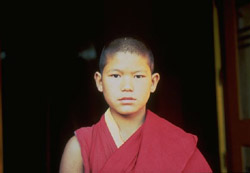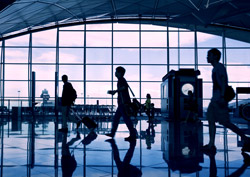Peoples on the Move
A God-Ordained Opportunity for Reaching the Unreached

Samuel and Young Cho are a middle-aged, Korean couple living in Lutherville, Maryland. Korean is their heart language and English is their second language. A few years ago, the Lord used this couple to begin Nepal Church of Baltimore, after they met a Nepalese waitress and her family. Recently, the Chos also planted a Bhutani church in Baltimore.
The Nepalese, whether from Nepal or Bhutan, are considered among the world’s least reached peoples . . . and they live in Baltimore, Maryland, USA.
In 2008 the Chos took a short-term mission trip to Nepal and visited the families of the church members living in Baltimore. While in Nepal, one family invited other family members to hear Samuel preach. Several people came to faith and the Antioch Church in Jamsa was planted. By the conclusion of the trip, over two hundred people had made a profession of faith in Jesus.
Did I mention the Nepalese are considered among the world‘s least reached peoples . . . and they live in Baltimore, Maryland, USA?
Shortly after returning from the first missionary trip, the Chos decided to take a second trip to Nepal to minister to refugees and also travel into India. After finally arriving in a Jhapa refugee camp in southeast Nepal, the Chos were able to locate relatives of members of the Nepal Church of Baltimore. During this visit the Chos were able to share letters and gifts from family members in the States. One of the family members living in Nepal made a profession of faith in Jesus.
While on this second missionary trip, the Chos were able to plant two more churches and to observe two hundred Nepalese, three hundred Bhutanese, and thirty-five Indians make professions of faith in Jesus.
And it began when Koreans living in Maryland started evangelizing and planting churches with Nepalese living in their neighborhood.
What if more believers like the Chos took seriously the need to cross cultural barriers and take the gospel to the least-reached peoples living in the Western world, where the challenges to getting the gospel to the people are not as daunting as trying to reach them in their homelands? What if more kingdom citizens living in Western nations recognized the Great Commission opportunity set before them—that the Sovereign Lord has moved the world into their neighborhoods so that such peoples may become his followers?
Imagine the global possibilities if churches would serve, share the good news, plant churches, partner with, and send the least-reached peoples of the world back to their families, tribes, villages, and cities as missionaries. Believers living in the West have dreamed and talked about these possibilities for some time. While some churches have moved beyond talking and are doing it, far too many kingdom citizens remain oblivious to the needs in their neighborhoods and the Great Commission potential that exists.
While the perspective used in this book is unique and contemporary, the notion of reaching those who migrate to our countries and sending them home with the good news is not new. For example, Frank Obien, in his book Building Bridges of Love: A Handbook for Sharing God’s Love with International Students, wrote that in the 1960s he noticed that while missionaries were traveling the world, international students were coming to the United States—only to return without anyone sharing the gospel with them. Don Bjork, in a 1985 Christianity Today article, attempted to raise awareness of the migration of the nations to the United States. Commenting on the realities in the 1970s and 1980s, he wrote:
Millions of strange new faces began appearing on the streets of American cities, collectively changing the face of the nation itself. But who in the church really noticed? Unseen or unheeded, the fields at home were long since ‘white unto harvest.’ Yet right down to the end of the 1970s, few missions leaders really knew what was going on. The ‘invisible migrants’ took no pains to hide, yet it seemed few missions took pains to seek.
Progress has been made since Bjork‘s article, but unfortunately it is too little and too slow. While such discussions have taken place in the past, most evangelicals have been slow to respond. The good news is that more and more people, churches, networks, denominations, societies, and mission agencies are talking about this topic once again and starting to act on the need.
Many of the world’s least-reached peoples live in our communities. Now is the time to cross the street and meet the strangers next door.
 Global movements of peoples across history, whether forced or voluntary, are under the eye of the Sovereign Lord. Migration does not occur by happenstance. This book is written from the conviction that God permits the movement of peoples across the globe in order to advance his kingdom. Some people move to locations and thus are able to hear the good news (Acts 17:26–27). Others, who are kingdom citizens, move and are able to share the good news in their new locations (Acts 1:8). With these points in mind, the purpose of this book is twofold.
Global movements of peoples across history, whether forced or voluntary, are under the eye of the Sovereign Lord. Migration does not occur by happenstance. This book is written from the conviction that God permits the movement of peoples across the globe in order to advance his kingdom. Some people move to locations and thus are able to hear the good news (Acts 17:26–27). Others, who are kingdom citizens, move and are able to share the good news in their new locations (Acts 1:8). With these points in mind, the purpose of this book is twofold.
First, it is my desire to educate the Western church on the scope of global migrations that are taking place as the peoples of the world move to the West in search of a better way of life. At present there are large numbers of believers and unbelievers migrating to Western nations. Much of the Western church is fairly ignorant as to the numbers, cultures, and beliefs of such peoples.
Second, I want to challenge the Western church to reach the least-reached people living in their neighborhoods and partner with them to return to their peoples as missionaries. An enormous Great Commission opportunity exists that seems to be going unnoticed by the church. The United States, Canada, the United Kingdom, other Western European nations, Australia, and New Zealand presently receive an enormous portion of the world’s migrants, with the United States receiving the largest percentage of those migrating to the Western world. Refugees, students, long-term and temporary workers, and immigrants move to these regions of the world every year.
At the time of this writing, the opportunities for ministering to such peoples are as simple as locating them, finding out their needs, and serving them with the love of Jesus. Obtaining visas is not a problem. Overcoming governmental opposition to missionary activity is not an issue. Western churches can easily begin welcoming and serving the strangers next door with little preparation. As migrants come to faith in Jesus, there are numerous opportunities for equipping, partnering, commissioning, and sending those believers as missionaries back to their people to multiply disciples, leaders, and churches.
The Divine Maestro
From a human perspective, the global movement of people from one geographical location to another is sometimes chalked up to sociocultural push-pull realities. War and famine push people out of East Africa while the promise of safety and a better life pulls them to France. A poor educational system in India pushes students out of their homeland to follow the pull of a better education in the United States. This view of the migration of peoples across the globe is a complex matter of economics, power, freedom, justice, and a better way of life. While such social forces are at work in our world today, we must realize that through such means the Sovereign Lord is working to bring about the expansion of his kingdom. Since the world is presently under the rule of the gods of this age, human wickedness sometimes brings slavery, hardships, death, and destruction, resulting in the forced migration of peoples. Yet the God of the ages is still in control while all of creation groans for his return (Romans 8:22).
 The premise of this book is that the Sovereign Lord orchestrates the movement of peoples across the globe in order to advance his kingdom for his glory. Whether through believers transferring jobs and finding themselves in new locations or unbelievers moving to cities of refuge where they may first come face-to-face with the message of Jesus, the migrations of peoples do not happen as an afterthought in the heart of God. The church may be oblivious to such workings of the Spirit, but the seasons and times of life are part of the King working out his plan to redeem the peoples of this world from the bondage of the wicked one.
The premise of this book is that the Sovereign Lord orchestrates the movement of peoples across the globe in order to advance his kingdom for his glory. Whether through believers transferring jobs and finding themselves in new locations or unbelievers moving to cities of refuge where they may first come face-to-face with the message of Jesus, the migrations of peoples do not happen as an afterthought in the heart of God. The church may be oblivious to such workings of the Spirit, but the seasons and times of life are part of the King working out his plan to redeem the peoples of this world from the bondage of the wicked one.
Until that day when the kingdoms of this world will all bow to the kingdom of God, the church is to be on mission, making disciples of all nations and teaching them obedience (Matthew 28:20). While a major part of making disciples occurs as we go throughout the world (Matthew 28:19), we must realize that the divine Maestro has been orchestrating the movement of peoples into our neighborhoods. He has been bringing the peoples of the uttermost parts of the world into our communities.
While this book in no way diminishes the importance of churches in the Western world going to other nations to reach peoples with the gospel, this book does offer a challenge to Western churches: what are you doing to reach, equip, partner with, and send the strangers next door back to their loved ones with the good news? Are they simply strangers with strange ways, or do you realize the Great Commission opportunity that is present?
children. I gave birth to my youngest child in that camp. Then we received the news that we were allowed to come to this country. We did not know the language and had very little money. When we arrived in the city, we lived in a bad part of town. I was mugged once and my children were harassed daily. We were completely lost and lonely. My knowledge of the language is still poor. We all still have nightmares about the things that happened in our own country. We also fear what will happen to us here in this new country. How will we survive? Does anyone care?
Immigration, Migration and Kingdom Perspective
• My name is Jo. I left my country six years ago looking for hope and a better life for my family. I came to this country to find a higher paying job so that I could take care of my wife and five children. I came here so my children could have an opportunity to receive a good education. I moved here in search of prosperity. What I found were twelve-hour workdays and very little time with my children. The longer we are here, the more I fear my children will forget who they are and where they come from; I want them to remember our language, our culture, and our family values. Very few people have befriended us. I miss the tight-knit community in my home country. We are so lonely here. Where is our hope? Who will be our friend?
• My name is Fatima. I came to this country five years ago with my eleven children after my husband was killed during the war in my country. Before coming to this country, we spent many years in a refugee camp in another country near our home. Life there was very hard. We had little food, and there was no schooling for my children. I gave birth to my youngest child in that camp. Then we received the news that we were allowed to come to this country. We did not know the language and had very little money. When we arrived in the city, we lived in a bad part of town. I was mugged once and my children were harassed daily. We were completely lost and lonely. My knowledge of the language is still poor. We all still have nightmares about the things that happened in our own country. We also fear what will happen to us here in this new country. How will we survive? Does anyone care?
• My name is May. I am an international student at the university. My dream is to become very successful and make my family and my country proud. It is a great honor to be able to come to this country to study, but taking classes in a different language is very hard. It is also difficult to be separated from my family. In my country, three generations of a family usually live together in one house. Here at the university, I live all by myself. I spend a great amount of time studying, and most of the time I am lonely. I want to get to know some nationals, but everyone seems so busy and like they are in such a hurry. Does anyone care? Who will be my family while I am here?
 While not all migrants share the same stories, Jo, Fatima, and May represent a great number of people migrating to countries across the world. For some, migration offers hope for a better way of life financially and educationally; for others, migration provides a way to escape persecution, war, and death. Highly skilled specialists and entrepreneurs migrate to a much better standard of living and quality of life than the family that is forced to relocate because of genocide. Some individuals and families move to other countries to be greeted by family and friends who preceded them, thus able to offer some stability and security to their newly arriving relatives. Others arrive as students, refugees, or workers, knowing few, if any, people.
While not all migrants share the same stories, Jo, Fatima, and May represent a great number of people migrating to countries across the world. For some, migration offers hope for a better way of life financially and educationally; for others, migration provides a way to escape persecution, war, and death. Highly skilled specialists and entrepreneurs migrate to a much better standard of living and quality of life than the family that is forced to relocate because of genocide. Some individuals and families move to other countries to be greeted by family and friends who preceded them, thus able to offer some stability and security to their newly arriving relatives. Others arrive as students, refugees, or workers, knowing few, if any, people.
Though the stories are not exactly alike, all migrants have stories to tell. While it is important for us to hear such stories, having a kingdom perspective requires that we are praying and looking for opportunities for the stories of migrants to intersect with the story of Jesus, so that their future stories involve him.1
Who Is Moving In Next Door?
by J.D. Payne
The Pew Forum on Religion and Public Life released an important report in March 2012 on the religious affiliations of international migrants. If you have not seen the report or fascinating interactive maps, you need to check them out here http://www.pewforum.org/Geography/Religious-Migration.aspx and here http://features.pewforum.org/religious-migration/map.php#/Destination/None/all.
Report Highlights
214 million international migrants exist in the world today. That is about 3% of the world’s population.Nearly half of the world’s migrants are Christian (49%), and more than a quarter are Muslim (27%).
Christians and Muslims are the two largest religious groups among migrants as well as the two largest religious groups in general. However, Christians comprise a much greater share of migrants (about one-in-two) than they do of the general population (nearly one-in-three). Muslims comprise only a slightly higher share of migrants (27%) than of the world’s population (23%). Hindus comprise 5% of international migrants but 10-15% of the global population.
In percentage terms, Jews have by far the highest level of migration. About one-quarter of Jews alive today (25%) have left the country in which they were born and now live somewhere else.*
The United States
Of the 43 million foreign-born people living in the United States as of 2010, an estimated 32 million (74%) are Christian. The U.S. also has been the top destination for Buddhist migrants (including many from Vietnam) and for people with no particular religion (including many from China).
The U.S. has been the world’s second-leading destination for Hindu migrants, after India, and for Jewish migrants, after Israel. Among Muslim migrants, however, the U.S. ranks just seventh as a destination—behind Saudi Arabia, Russia, Germany, France, Jordan and Pakistan.
There were more than 2 million Muslim immigrants living in the U.S. as of 2010, representing about 5% of the U.S. immigrant population.
The U.S. leads all other countries as a destination for international migrants overall. One of every five international migrants alive today resides in the United States.
Mexico has been by far the largest country of origin for U.S. immigrants. In fact, the U.S. has received about as many migrants from Mexico alone (more than 12 million, including both legal immigrants and unauthorized ones) as any other nation has received from all sources combined. Among the other leading countries of origin for U.S. immigrants are the Philippines (1.8 million), India (1.7 million), China (1.4 million) and Germany (1.2 million).2
As we think missiologically about these realities, it is helpful to consider a challenge that was published in Scattered to Gather (http://www.jdpayne.org/wp-content/uploads/2010/10/Scattered-to-Gather.pdf) that missions should be done to the diasporas, through the diasporas, and beyond the diasporas.
Missions to the Diasporas
We must reach the unreached who have migrated into our neighborhoods. Many of the word’s unreached peoples have migrated not only to the West but also to many countries of the Majority World, offering the Church there wonderful Great Commission opportunities to respond in love, service, and sharing the faith. Many of the strangers next door are the keys to unlocking doors into the lostness of people you and I will never be able to meet.









comments